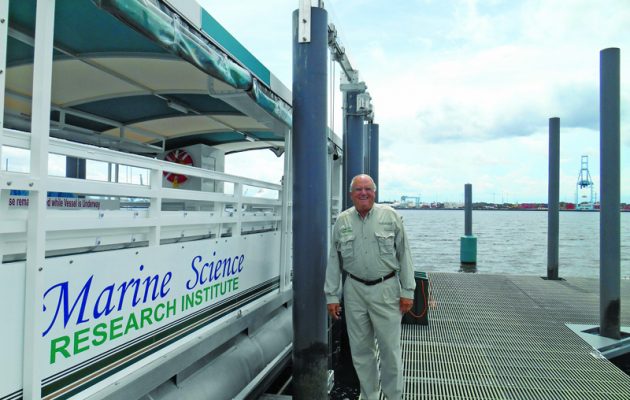JU’s floating classroom enables further study of marine biology
Posted on July 2, 2014 By Editor Articles, Neighborhood News, Top Stories

Starting this fall, Jacksonville University’s floating classroom will plow full speed ahead loaded with young scientists studying the St. John’s River and the life it supports.
Although dedication of the 48- by 12-foot pontoon laboratory and its new dock made a big splash at JU last January, the boat has been undergoing Coast Guard certifications and other operations in preparation for its full-time launching this coming semester, according to Dr. Quinton White, executive director of the university’s Marine Science Research Institute (MSRI). Summer activities include classes and a youth marine camp.
Until now, very few students were able to go on the river to study it at the same time, and they had limited resources.
“We have small boats that hold two to three students, but this will hold 28, so we can take an entire class to do hands-on work on the river, which we have never been able to experience before,” said White, who lives in San Jose. “I don’t know of other schools that have this.”
Built specifically for the MSRI by Trident Pontoons as a nautical classroom and lab, the boat is equipped for trawling, water quality and bottom sampling, observing manatees and dolphins, and various related activities.
Similar to the water taxis that transport people across the St. John’s River downtown, JU’s pontoon is identifiable at a distance by its distinctive white and forest green awning, and up close by its sophisticated dredge and other equipment that give area marine science and biology students a significant academic advantage.
The boat’s new captain Gary Kirkland compared it to a small barge with a platform so sturdy that students and their instructors are able to do bottom sampling and actually look at freshly caught plankton through microscopes while it is still running. A trawl net and holding areas allow them to catch and study small fish and other animals.
No stranger to the St. John’s, Kirkland is retired from the Duval County School System where he most recently taught marine biology and oceanography at Fletcher High School. A former captain of the Annabelle Lee riverboat, he grew up near the Trout River and once kept a boat in Ortega.
White said the MSRI works with the National Oceanic and Atmospheric Administration (NOAA) on dolphin research and is very involved in the St. John’s River NOAA PORTS (Physical Oceanographic Real Time Sensors) System that is scheduled to be dedicated later this month. The system has sensors at 19 locations – including JU, Southbank Riverwalk and Acosta Bridge – that will provide meteorologic and oceanographic data.
White expressed appreciation for the generosity of donor families that helped make the dream of a floating classroom a reality. The more than $500,000 cost of the boat and dock was funded largely by JU alumnus W.C. Gentry and JU trustees Lawrence Kurzius and Chuck Wodehouse. The pontoon is named the Larkin after Kurzius’ daughter who was a marine science graduate from JU.
Likely no one is more familiar with the workings of the Larkin than Brooks Busey, JU’s go-to guy for maintenance for the floating classroom. Part owner and manager of the Sadler Point Marine Center tucked up under the Roosevelt Boulevard bridge, Busey commended White for his vision and JU for providing this terrific resource for the City of Jacksonville.
Busey is a former board member of the St. Johns Riverkeeper where his wife, Jennie, works as education director. “This floating classroom is a neat way to get students out on the river and experience the river,” he said. “People are not going to care about the river unless they are exposed to it. This serves that purpose.”
“It’s almost limitless what we can do,” said White. “This is a great boat that exceeded our expectations.”
By Lorrie DeFrank
Resident Community News




 (No Ratings Yet)
(No Ratings Yet)




